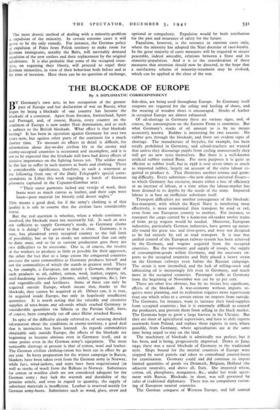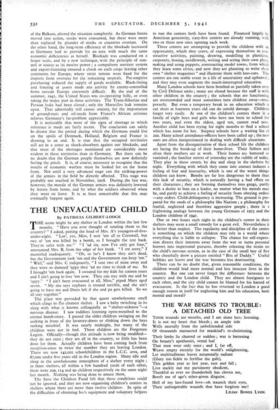THE BLOCKADE OF EUROPE
By A DIPLOMATIC CORRESPONDENT
BY Germany's own acts, in her occupation of the greater part of Europe and her declaration of war on Russia, what began by being a blockade of one country has become the blockade of a continent. Apart from Sweden, Switzerland, Spain and Portugal, and, of course, Russia, every country on the continent of Europe is now under Nazi domination, and as such is subject to the British blockade. What effect is that blockade having? It has been in operation against Germany for over two years now, but against other parts of the continent for a much shorter time. To measure its effects in detail is difficult, for information about day-to-day civilian life in the enemy and enemy-occupied countries is occasional and incomplete, and it is not to be expected that the blockade will have had direct effects of decisive importance on the fighting forces yet. The soldier must be the last to suffer in such matters as boots and clothing. There is considerable significance, therefore, in such a statement as the following from one of the Daily Telegraph's special corre- spondents in Libya this week regarding a batch of German prisoners captured in the Capuzzo-Gambut area :
" Their outer garments lacked any vestige of wool, their boots were as much canvas as leather, and their caps were linen—poor material for bitterly cold desert nights."
This means a good deal, for if the army's clothing is of that quality it is safe to assume that the civilian fares considerably worse.
But the real question is whether, when a whole continent is involved, the blockade must not necessarily fail. Is such an area not sufficient to supply Germany's needs, as Germany claims that it is doing? The answer to that is clear. Germany, it is true, has plundered every occupied country to the full limit of possibility, but so far as stocks are concerned that can only be done once, and so far as current production goes there are two difficulties to be overcome. One is, of course, the resolve of the workers to produce as little as possible for their aggressor, the other the fact that to a large extent the conquered countries produce the same commodities as Germany produces herself and not the commodities of which she stands in greatest need. There is, for example, a European, not merely a German, shortage of such products as oil, rubber, cotton, wool, leather, copper, tin, steel-hardening ferro-alloys (chrome, nickel, tungsten, &c.), fats and vegetable-oils and fertilisers. Some of these can only be acquired outside Europe, which means that, thanks to the blockade, they cannot be acquired at all. Others can, it is true, be acquired inside Europe, but only in hopelessly insufficient quantities. It is worth noting that the valuable and extensive supplies of soya-beans and oil-seeds which reached Germany in considerable quantities via Siberia or the Persian Gulf, have, of course, been completely cut off since Hitler attacked Russia.
In spite of the difficulty already referred to, of securing detailed information about the conditions in enemy-territory, a good deal that is instructive has been learned. As regards commodities obtainable only outside Europe, the effects of the blockade are beginning to become obvious even in Germany itself, and at some points even in the German army's equipment. The most noticeable shortage at present is that of cotton, wool and leather. The German civilian clothing-ration has been cut in effect by 40 per cent. In hasty preparation for the winter campaign in Russia, blankets have been taken even from the German army in Norway, while furs, wind-jackets, and tents have been requisitioned (as well as stocks of wool) from the Balkans to Norway. Substitutes for cotton or woollen cloth are not considered adequate for the German army ; they lack the warmth and durability of the genuine article, and even in regard to quantity, the supply of substitute materials is insufficient. Leather is reserved mainly for German army-boots. Substitutes such as wood, glass, straw and
fish-skin, are being used throughout Europe. In Germany itself coupons are required for the soling and heeling of shoes, and the wearing of wooden shoes is encouraged. Stocks of leather in occupied Europe are almost exhausted.
Of oil-shortage in Germany there are various signs, and, of course, the consumption on the Eastern Front is enormous. But what Germany's stocks of oil amount to is by no means accurately known. Rubber is interesting for two reasons. No rubber gets through the blockade, and there are evident signs of shortage. The manufacture of bicycles, for example, has been totally prohibited in Germany, and school-teachers are warned that unless they discourage pupils from cycling unnecessarily they will get no new tyres themselves. But there is a well-known artificial rubber named Buna. For most purposes it is quite as efficient as rubber itself, but in 1938 it cost seven times as much as imported rubber, largely on account of the extra labour re- quired to produce it. That illustrates another serious and grow- ing difficulty. Every substitute—the now almost universal Ersatz— to which Germany has recourse, means either a loss of efficiency or an increase of labour, at a time when the labour-market has been drained to its depths by the needs of the army. Imported labour is at best an inefficient substitute itself.
Transport difficulties are another consequence of the blockade. Sea-transport, with which the Royal Navy is interfering most effectively, is more economical than transport by road or rail, even from one European country to another. For instance, to transport the cargo carried by a 6,000-ton oil-tanker twelve trains of from 30-35 wagons would be needed. Moreover, European industries, particularly German industries, have grown up natur- ally round the great sea- and river-ports, and were not designed to be fed entirely by rail or road transport. It is true that unified control of the European railway-system has been achieved by the Germans, and wagons acquired from the occupied countries. But the movement and supply of troops, the supply of consumption-goods within Germany, and the necessary ex- ports to the occupied countries and Italy placed a heavy strain on the German railways even before the Russian campaign. The strain is now intensified, and the lack of rolling-stock and lubricating oil is increasingly felt even in Germany, and much more in the occupied countries. Passenger traffic in Germany from the beginning of November was cut by 50 per cent.
There are other less obvious, but by no means less significant, effects of the blockade. A war-economy without imports re- quires more planning, and its realisation requires more supervision than one which relies to a certain extent on imports from outside. The Germans, for instance, want to increase their food-supplies from occupied countries ; but it is extremely difficult to control the producers, and prevent them from selling in the black market. The Germans hope to grow a large harvest in the Ukraine. But they are short of agricultural supervisors, and have to shift experts eastwards from Poland, and replace those experts in turn, where possible, from Germany, where agriculturists are at the same time being urged to stay on the land.
The machinery of blockade is admittedly not perfect, but it has been, and is being, progressively improved. Down to June, 1940, there was a naval blockade of Germany in the traditional style. Ships bound for the neutral countries of Europe were stopped by naval patrols and taken to contraband control-bases for examination. Germany could and did continue to import limited quantities of goods via Denmark, Belgium, Holland (the adjacent neutrals), and above all, Italy. She imported wheat, cotton, oil, phosphates, manganese, &c., under her trade agree- ment with Russia. Blockade, in short, was still governed by rules of traditional diplomacy. There was no compulsory ration- ing of European neutral countries.
The German conquest of Western Europe, and full control of the Balkans, altered the situation completely. As German forces moved into action, stocks were consumed, but these were more than replaced by plunder of stocks in countries overrun. On the other hand, the long-term efficiency of the blockade increased as Germany had to provide fot an area with much the same economic deficiencies as herself. Blockade was conducted on a larger scale, and by a new technique, with the principle of con- trol at source as its motive power ; a compulsory navicert system and export-licensing ensured a check on each cargo leaving other continents for Europe, where strict rations were fixed for the imports from overseas for the remaining neutrals. Pre-emptive purchasing reduced the supply of goods available. Black-listing and freezing 01 assets made any activity by enemy-controlled firms outside Europe extremely difficult. By the end of the summer, 1941, the United States was co-operating fully, or even taking the major part in these activities. The Trans-Siberian and Persian leaks had been closed ; only the Marseilles leak remains open. That admittedly still causes anxiety, for the importation of ground-nuts and oil-seeds from France's African colonies relieves Germany's fat-problem appreciably.
It is noticeable that most of the signs of shortage to which reference is made are fairly recent. The conclusion can safely be drawn that the period during which the Germans could live on the spoils of Denmark, Holland, Belgium and France is drawing to an end. It is true that the occupied territories still act in a sense as shock-absorbers against our blockade, and that most of the shortages mentioned are considerably more evident in these territories than in Germany. But there can be no doubt that the German people themselves are now definitely feeling the pinch. It is, of course, necessary to recognise that the results of economic warfare must be looked for on the home front. Not until a very advanced stage can the striking-power of the armies in the field be directly affected. This stage was probably not reached in November, 1918. During, the last war, however, the morale of the German armies was definitely lowered by letters from home, and by what the soldiers observed when they went on leave. It is at least conceivable that this may eventually happen again.























 Previous page
Previous page